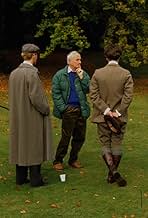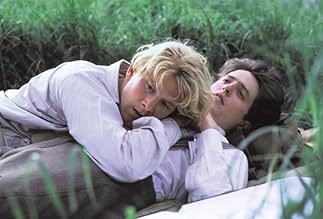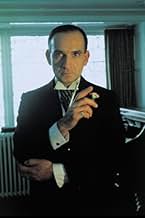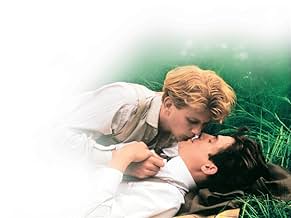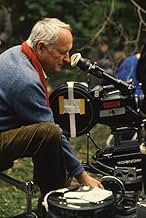Two English school chums find themselves falling in love at Cambridge. To regain his place in society, Clive gives up Maurice and marries. While staying with Clive and his wife, Maurice disc... Read allTwo English school chums find themselves falling in love at Cambridge. To regain his place in society, Clive gives up Maurice and marries. While staying with Clive and his wife, Maurice discovers romance in the arms of the gamekeeper Alec.Two English school chums find themselves falling in love at Cambridge. To regain his place in society, Clive gives up Maurice and marries. While staying with Clive and his wife, Maurice discovers romance in the arms of the gamekeeper Alec.
- Director
- Writers
- Stars
- Nominated for 1 Oscar
- 3 wins & 2 nominations total
- Director
- Writers
- All cast & crew
- Production, box office & more at IMDbPro
Featured reviews
A gay classic that is situated at the beginning of the twentieth century. 'Maurice' is the story of Maurice Hall, a student at the University of Cambridge, United Kingdom. There he meets Clive Durham. Both men develop a strong friendship, which to a certain level, becomes physical. Clive is gay, but Maurice doesn't want to know anything about it. Until he admits he also has feelings for persons of the same sex, even though in intellectual circles homosexuality is 'the love that dare not speak its name'.
Maurice doesn't know how to behave. Of course he wants to be himself, but society doesn't accept gay people. When he more or less decides to live as a gay man bosom friend Clive changes his mind, frightened by a lawsuit against a gay man. According to Clive the physical friendship between Maurice and Clive must end and from that moment on he wants to experience real love: the love of a woman. The relation between Maurice and Clive gets tense.
Even Maurice tries to get his sexual preference changed by visiting a hypnotist, but the treatment fails. That becomes very clear when Maurice sleeps with Scudder, Clive's under gamekeeper. A passionate love develops between Scudder and Maurice, which makes Clive realize what kind of appearance he has to keep up as a 'converted' gay man.
'Maurice' is based on the novel of the same name written by E.M. Forster. The film is beautiful and made with a feeling for historical notion. The actors playing the leading roles are straight in real life but act the gay roles in a beautiful way. Actually everything in the film is right: image, usage of language, costumes and music.
Maurice doesn't know how to behave. Of course he wants to be himself, but society doesn't accept gay people. When he more or less decides to live as a gay man bosom friend Clive changes his mind, frightened by a lawsuit against a gay man. According to Clive the physical friendship between Maurice and Clive must end and from that moment on he wants to experience real love: the love of a woman. The relation between Maurice and Clive gets tense.
Even Maurice tries to get his sexual preference changed by visiting a hypnotist, but the treatment fails. That becomes very clear when Maurice sleeps with Scudder, Clive's under gamekeeper. A passionate love develops between Scudder and Maurice, which makes Clive realize what kind of appearance he has to keep up as a 'converted' gay man.
'Maurice' is based on the novel of the same name written by E.M. Forster. The film is beautiful and made with a feeling for historical notion. The actors playing the leading roles are straight in real life but act the gay roles in a beautiful way. Actually everything in the film is right: image, usage of language, costumes and music.
Similar to goldilocks-78, I watched Maurice again - I saw it when I was in my 20s, when it was first released. There is some very good acting, and a very good sociological recreation of the Edwardian period. Maurice, the novel, might well not be considered as EM Forster's finest work. But similar to Lady Chatterley's Lover (not considered among Lawrence's best), the work raises issues of class, gender, and sexuality. The three leads are good - Hugh Grant gives a plausible portrayal of a more refined, upper-class man, who denies his homosexual urgings and marries. He clearly shows (after this conversion of sorts) his ambivalence and almost forced denial. Hugh Grant, almost effortlessly, shows the two sides to this character. James Wilby,as Maurice, moves from self-disgust, despair and guilt, to self-acceptance. Rupert Graves as Scudder (similar to Mellors) is really good. The scenes he shares with James Wilby are not forced. The supporting cast are good - the women, Simon Callow (who introduces us to the Edwardian conformist ideology) are equally good. And Ben Kingsley, as the hypnotherapist nicely shows the push-pull in the then-British psyche. My favourite Merchant-Ivory film is Room with a view. Maurice is darker, but just as well filmed, with enough humour to balance the seriousness of the film. The naive, happily-ever-after ending (EM Forster's) doesn't quite work, but leads to good discussion. Of all the DVD-shown deleted scenes, the final 'confrontation' between Maurice and Durham should be, in my opinion, restored. It's a fine film, both engaging and unsettling. Sensitively adapted, directed, acted and shot. Kudos
I ran into this movie a long, long time ago, watching the TV news one evening back in 1987. I felt as I couldn't miss it as soon as I realized it had been shot in Cambridge, my favorite place in the world, but all my feelings went much beyond that when I saw it. I didn't feel uneasy about homosexuality at all but it was with that movie that I finally realized it was only love, no matter whether it involved a man and a woman, or two men, or two women.... The set is magnificent, the actors at their best (a great Hugh Grant who was so great as to show how Mr E.M.Forster had become tired with Clive...), and I must say that Mr Ivory did a pretty good job with his version of the story, very well adapted. In fact I do believe the book is superior in many moments but, on the other hand, the film is far far superior in many other moments, and you can't really say this all the times. I suggest everybody should watch it and enjoy it, no matter what your sexual preferences are. A masterpiece, indeed!
Many viewers and critics have criticised the happy ending of this film as being 'unrealistic' or even 'impossible'. After all an upper class and working class man could never live as a couple in Edwardian England? In fact E.M. Forster's inspiration for writing the book Maurice was a real gay couple, one upper class and the other working class, who lived together openly in England for about 35 years until 1928. They are buried in the same grave.
Edward Carpenter was a close friend of E.M.Forster, who named Carpenter's working class gay partner, George Merrill, as the inspiration for his novel Maurice. He had visited Carpenter and Merrill at Millthorpe in Derbyshire on several occasions: once, in 1913, Merrill "touched my backside - gently and just above the buttocks. I believe he touched most people's. The sensation was unusual and I still remember it, as I remember the position of a long vanished tooth. He made a profound impression on me and touched a creative spring" That was the origin for the writing of Maurice.
Edward Carpenter was a close friend of E.M.Forster, who named Carpenter's working class gay partner, George Merrill, as the inspiration for his novel Maurice. He had visited Carpenter and Merrill at Millthorpe in Derbyshire on several occasions: once, in 1913, Merrill "touched my backside - gently and just above the buttocks. I believe he touched most people's. The sensation was unusual and I still remember it, as I remember the position of a long vanished tooth. He made a profound impression on me and touched a creative spring" That was the origin for the writing of Maurice.
I remember I saw this movie I was about 17. I'd read the book and fell in love. It tells a love story between two men and the way they have to carry it out despite society rules (with some changes it still happens nowadays...).
The general message would be "love conquers all" but is it really so? Are Maurice and Scudder able to live happily ever after? I doubt, and on the beginning of the XXth century it would be even worse.
Despite all, it's lovely to watch the same kind of story we're used to watching in movies that portray society in different times, but now speaking about love between men! Although James Ivory's work is beyond criticism, in my point a view, there were some scenes in the book (the one when they are in London, sitting naked by the fire, for instance) that really should be in the movie.
But it's a tender and romantic approach of of book (only published after E.M. Foster's death) that surely would have pleased it's author.
The general message would be "love conquers all" but is it really so? Are Maurice and Scudder able to live happily ever after? I doubt, and on the beginning of the XXth century it would be even worse.
Despite all, it's lovely to watch the same kind of story we're used to watching in movies that portray society in different times, but now speaking about love between men! Although James Ivory's work is beyond criticism, in my point a view, there were some scenes in the book (the one when they are in London, sitting naked by the fire, for instance) that really should be in the movie.
But it's a tender and romantic approach of of book (only published after E.M. Foster's death) that surely would have pleased it's author.
Did you know
- TriviaIn the DVD extras, Hugh Grant says that because he and James Wilby already knew each other from appearing in Privileged (1982) together, they were able to practice their scenes together at Grant's house the night before Wilby's audition. Grant says that he remembers it "being a surprise to my banker brother when he came home and found me kissing James Wilby in the front room."
- GoofsDuring one of the earlier scenes while Maurice and others are reading/translating with a professor/dean, Maurice is seen clearly wearing a wristwatch. While wristwatches did exist at the time they were rare, and were considered working class so would not have been worn by a gentleman. The wristwatch would not become common until the first world war, when they were given to soldiers to allow them to see the time while both hands were engaged.
- Quotes
Maurice Hall: I'm an unspeakable of the Oscar Wilde sort.
- Alternate versionsSome NTSC versions are scanned at 25fps and the running time is short and seems edited but the movie is intact.
- SoundtracksMiserere Psalm 51
Written by Gregorio Allegri
Sung by The Choir of Kings College Cambridge
Courtesy of The Decca Record Company LTD.
- How long is Maurice?Powered by Alexa
Details
- Release date
- Countries of origin
- Official sites
- Language
- Also known as
- Moris
- Filming locations
- Production companies
- See more company credits at IMDbPro
Box office
- Budget
- £1,577,000 (estimated)
- Gross US & Canada
- $2,484,230
- Opening weekend US & Canada
- $49,278
- Sep 20, 1987
- Gross worldwide
- $2,643,324
- Runtime
- 2h 20m(140 min)
- Sound mix
- Aspect ratio
- 1.66 : 1
Contribute to this page
Suggest an edit or add missing content


